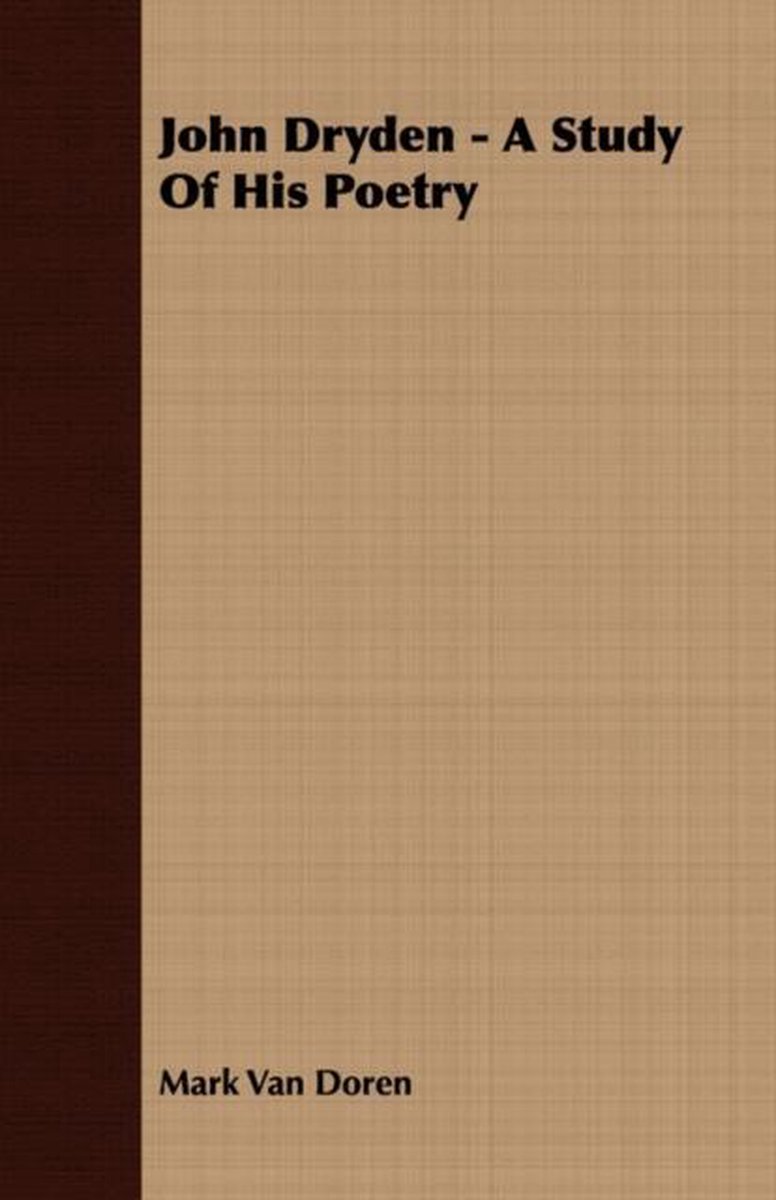John Dryden - A Study Of His Poetry
John Dryden A Study of His Poetry MARK VAN DOREN - CONTENTS I. THE MAKING OF THE POET Page i II. FALSE LIGHTS 30 III. THE TRUE FIRE 67 IV. THE OCCASIONAL POET 107 V. THE JOURNALIST IN VERSE 140 VI. THE LYRIC POET 174 VII. THE NARRATIVE POET 207 VIII. REPUTATION CONCLUSION 233 APPENDIX The Authorship of Mac Flecknoe 267 INDEX 279 PREFACE TO 1946 EDITION THIS ESSAY was first published in 1920 by Harcourt, Brace and Howe, New York. Ten years later there was enough desire for it in England, and enough difficulty about securing copies, to justify the second edition which Gordon Fraser published at the Minority Press, Cambridge, in 1931. Now, twenty-five years after its original appearance in America, it is published here again. I am grateful to Harcourt, Brace and Company and to the Minority Press for the freedom I enjoy to present the essay a third time for such use as poets, critics, students, and other readers care to make of it. It is an extended study of one poets art. It stands or falls by the amount of truth about that poet, or about poetry in general, which it contains. For this edition I have made a number of minor revisions, but the essay remains substantially unaltered. My original preface prepared the reader for a more or less enthusiastic treatment of Dryden. I have kept my enthusiasm. Indeed, the revisions I refer to often consist in efforts to tone up what I once, in an ardor to be judicial, toned down. The essay was a doctoral dissertation at Columbia University, and in writing it I did not take the fullest advantage of a liberty which I still consider myself lucky, not to say unique, for having possessed. This was the liberty to go ahead and say all I could about animportant writer, in whatever language seemed suitable to my self and him. The suggestion that I do so came from my brother, Carl Van Doren, and was favorably received by W. P, Trent, the professor whom I would have to please. I would have to please him, that is, with a finished essay j meanwhile the vii vili PREFACE risk was altogether mine. The procedure still seems sensible to me, and I have urged it since on many candidates, but none of them has pursued it. If one ever does, I shall recommend that he avoid the cliches of qualification which I seem to have thought it sounded wise to use. I am happy now to have them out of the way. Dryden is the kind of great poet it is good to know at any time, for he is a great writer. Of some poets, even though they be very fine, we do not say seriously that they are writers. From the way Dryden wrote there is always something to be learned, and in fact it has been said of this essay, by T. S. Eliot and others, that it shows how the learning may be done. But in twenty-five years I have not seen it being done. I am not saying that it should be done, or that I have succeeded in showing how it could be. I merely observe that contemporary poetry and criticism give no evidence of having benefited by the study of Drydens art. Clear evidence to the contrary is to be found in the fact that verse is almost everywhere held in contempt. Verse is not every thing, but to assume that it is nothing is to ignore a primary source of pleasure and power, and in the end is to emasculate poetry. We have cults of sensibility and sincerity 5 we are mar velously responsive to ambiguities 5 we know how to plot the oblique course, to surprise words into revealing threesenses when there was none before we can find politics in metaphor, morality in syntax, and myth in minor parts of speech. But we do not act as if we had ears. Ears are not everything, but the absence of them leaves poetry dangerously dead. Dryden had a great ear...
- Ean/ISBN: 9781406724882
- Review:
